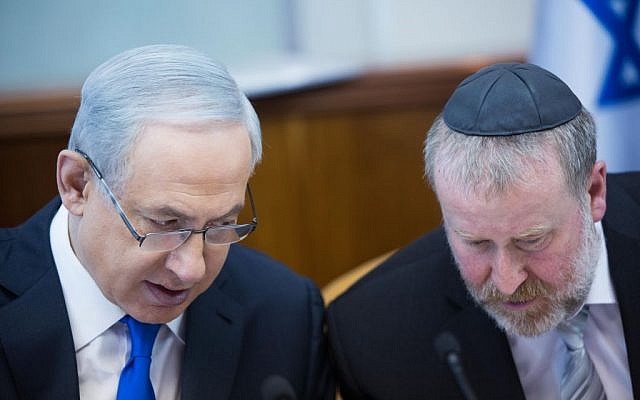Attorney general refuses PM’s request for a full-year delay, says public interest is for a speedy resolution

Attorney General Avichai Mandelblit on Wednesday agreed to postpone the pre-indictment hearing for Prime Minister Benjamin Netanyahu in three criminal cases by almost three months.
The hearing had been scheduled for July 10 — three months after the investigation material was made available to Netanyahu’s lawyers, who took more than a month to collect it — but will now be held on October 2-3, Mandelblit announced. If needed, a third day would be added the following week.
Netanyahu’s attorneys had asked the attorney general for a full-year delay, arguing that the scope of the documents was too large to review in three months.
Mandelblit refused that request, saying it was not in the public interest.
“There is no justification for the hearing to be set — as you requested — for a year after you collected the investigation material, which would harm the vital public interest of making a decision in the cases as soon as possible,” Mandelblit wrote. “Under the current circumstances, there is no justification for this.”
Mandelblit announced his intention to indict Netanyahu for fraud and breach of trust in the three cases against him, and for bribery in one of them, in February. The prime minister’s attorneys requested, and were granted, that the case files not be handed over prior to the April 9 national election in order to prevent information from leaking to the media and affecting the vote.
But after the election, the lawyers refrained for another month from collecting the material, citing a dispute over their fees. They have been accused of engaging in delay tactics.

Meanwhile, Netanyahu is believed to be seeking legislation that could shield him from prosecution, though he has encountered significant opposition to such moves, including from members of his own party.
Netanyahu repeatedly insisted in the run-up to the elections that he would not push for legislation granting him automatic immunity. However, several recent media reports have suggested he later decided to move forward with plans to pass such a law.
Sources close to the prime minister said Sunday that in light of the pushback, he had decided not to move forward with a new law and would work with the existing immunity law as amended in 2005.
The existing legislation requires legitimate reasons under which Netanyahu can seek immunity against prosecution while he remains in office, such as asserting that the public interest would be harmed by a trial, or that the will of the electorate would be subverted. Another clause in the law says immunity can be granted if an indictment “has been issued in bad faith or because of discrimination.”
Meanwhile, Netanyahu is also reportedly working to promote a bill that would allow the government to overrule the High Court of Justice on administrative matters and that could safeguard the prime minister’s immunity from prosecution by permitting the annulment of any judicial decision to rescind it.
Case 1000 involves accusations that Netanyahu received gifts and benefits from billionaire benefactors including Israeli-born Hollywood producer Arnon Milchan in exchange for favors; Case 2000 involves accusations that Netanyahu agreed with Yedioth Ahronoth newspaper publisher Arnon Mozes to weaken a rival daily in return for more favorable coverage from Yedioth; and Case 4000, widely seen as the most serious against the premier, involves accusations that Netanyahu advanced regulatory decisions that benefited Shaul Elovitch, the controlling shareholder in the Bezeq telecom giant, to the tune of hundreds of millions of dollars, in exchange for positive coverage from its Walla news site.
As reported by The Times of Israel
